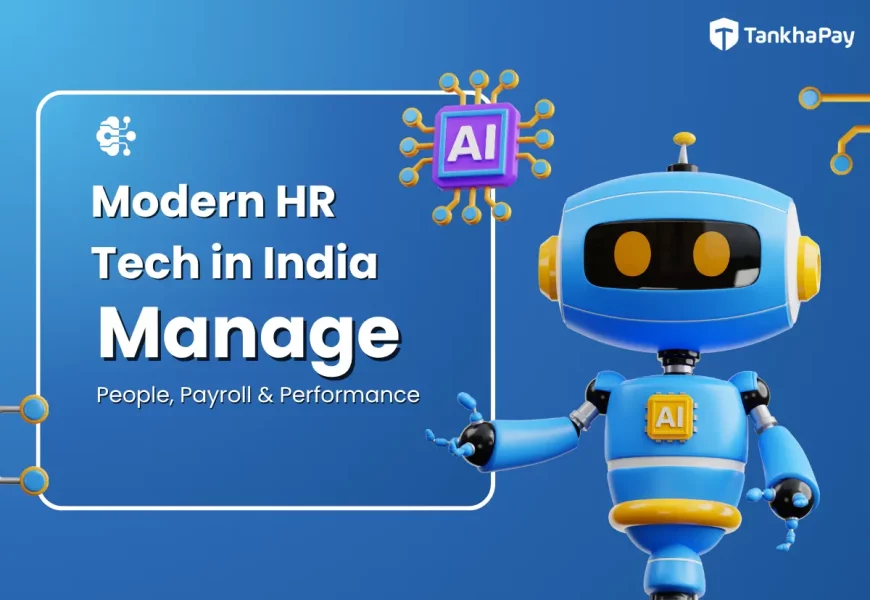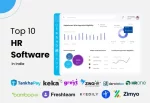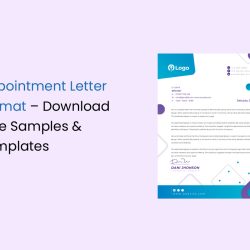“AI won’t replace you. A person using AI will.”-Garry Kasparov
This modern observation speaks volumes in today’s evolving workplace. It’s not the technology displacing people— the individuals who understand and leverage technology make the difference.
In Human Resources, this perspective is more relevant than ever.
Some people worry that HR technology might one day replace HR jobs, but that’s not the case. In reality, HR tech is designed to support professionals, not replace them. While tools can manage data and speed up tasks, they can’t think creatively, show empathy, or build real connections like people can.
HR Tech Empowers, Not Replaces, HR Professionals. It saves time on routine tasks so HR teams can focus on what really matters—people, culture, and growth.
HR technology handles the repetitive, time-consuming tasks that drain productivity, freeing up HR professionals to concentrate on employee engagement, talent development, and strategic workforce planning.
What is HR Tech?
HR Tech or HR Technology includes the digital tools, platforms, and software used to simplify and manage everyday HR tasks in an organisation. Whether it’s hiring new talent, onboarding employees, payroll processing, tracking attendance, or staying compliant with labour laws, HR Tech brings everything into one streamlined system. Instead of relying on manual paperwork or juggling multiple tools, HR professionals can use these technologies to save time, reduce errors, and focus more on people and strategy. Payroll Software enables companies to manage their workforce efficiently, accurately, and transparently.
What is an HRMS?
Human Resource Management System, also called HRMS, is a digital platform that streamlines core HR processes from employee records and leave tracking to payroll and benefits. It centralises workforce data, automates daily HR tasks, and supports compliance making it ideal for small to mid-sized organisations.
What is HCM?
HCM (Human Capital Management) refers to systems and practices designed to manage and optimise an organisation’s people investment across their lifecycle—from hiring and onboarding to development, performance, and retention. HCM platforms typically include modules for learning, career planning, and talent management, beyond HR tasks.
What is the Difference Between HCM, HRMS and HRIS?
- An HRIS (Human Resource Information System) is the broader umbrella—it handles employee data, reporting, and compliance.
- An HRMS (a subset of HRIS) automates transactional HR tasks, such as payroll, leave, and attendance.
- HCM goes beyond these, encompassing strategic workforce initiatives, talent development, and employee engagement.
HR Tech Adoption in India: Key Statistics & Growth Projections
HR tech is being adopted more widely across India, with more businesses—especially in smaller cities and industries like manufacturing—moving towards digital HR solutions. As of 2024, the Indian HR tech market is expected to grow at an annual rate of around 10–12% until 2030, showing just how important digital tools are becoming for managing today’s workforce. Some of the upcoming trends are:
- SMEs and manufacturing sectors are increasingly turning digital to manage compliance and attendance.
- Cloud-based tools, MSME-focused platforms, and mobile access are becoming popular in tier-2 and tier-3 cities.
- Off-roll and blue-collar workforce management increasing demand for geofencing, payroll, and digital onboarding tools.
Given these changes, HR Tech in India is no longer just a nice to have. It is now essential for businesses that want to grow and work more efficiently.
Predictive Analytics in HR for Better Workforce Planning
Modern HR Tech is not just transactional but also predictive. With dashboards and analytics, HR leaders can
- Anticipate attrition risks, absenteeism patterns, and staffing shortages.
- Identify skilled talent gaps and pre-plan upskilling or hiring.
- Plan budgets and employee headcount more accurately based on trends.
This shift from reactive to proactive decision-making turns HR into a strategic function rather than an administrative one.
Why HR Tech Matters More Than Ever?
Tasks like calculating payroll, maintaining compliance, tracking leave, and managing employee records demand accuracy, consistency, and speed—something traditional methods struggle to deliver.
This is why HR Technology has evolved from being a convenience to a business imperative. It offers much more than digitalisation—it introduces intelligence, structure, and agility into HR functions. Here’s why adopting HR Tech is no longer a luxury but a necessity:
1. Time-saving automation of repetitive tasks
Routine responsibilities such as attendance tracking, leave approvals, payslip generation, and compliance filing can now be handled in just a few clicks—saving hours each week.
2. Centralised employee data management
A unified database makes it easier to store, access, and update employee information securely, eliminating silos and reducing administrative load.
3. Accurate payroll processing and compliance tracking
Integrated payroll systems automatically calculate salaries, apply deductions, and generate statutory reports—minimising errors and ensuring timely compliance with PF, ESI, TDS, and other obligations.
4. Enhanced employee experience through self-service portals
Employees can independently apply for leave, download payslips, update personal details, or check attendance, reducing HR dependencies and improving transparency.
5. Real-time insights for better decision-making
HR dashboards and reports offer visibility into workforce trends, enabling data-driven hiring, retention, performance, and resource planning decisions.
In short, HR Tech helps HR professionals do more with less—freeing up time for strategic work that requires the human touch.
Benefits of HR Technology to Business?
HR technology doesn’t just make HR tasks easier—it also brings real value to your business. The benefits range from saving time and money to improving employee satisfaction and ensuring compliance. Here’s how HR Tech can make a difference to your organisation:
- Saves Money
- Increases Productivity
- Keeps Employees Happy
- Helps Stay Compliant
Companies can cut HR costs by 22–40% by automating tasks. It also reduces costly mistakes caused by manual work.
HR teams become more efficient, spending less time on admin and more on people-focused strategies. Quick access to data also speeds up decision-making.
Employees feel more satisfied and engaged with self-service options and faster responses to queries.
Automated tracking helps you follow the law, lowering the chance of fines and making audits simpler.
Essential HR Technology Solutions
The HR Tech ecosystem is vast, but some core modules are at the heart of most platforms:
- Recruitment and Applicant Tracking Systems (ATS)
ATS and recruitments systems are designed for HR to automatically post jobs, find candidates, and scheduling interviews results in hiring faster and easier. - Employee Onboarding
Smart onboarding tools handle the paperwork and keep new hires on track, helping them feel part of the team from day one. - Payroll Management Software
Automates salary calculations, tax deductions, PF/ESI compliance, and generates payslips—saving HR teams hours every month. - Leave and Attendance Management
Helps track working hours, leaves, absenteeism, and holiday calendars—ensuring accurate compensation and workforce planning. - Performance and Appraisal Tools
Supports goal setting, performance reviews, and employee feedback for more transparent evaluations. - Employee Self-Service Portals
Empower employees to manage their profiles, download payslips, apply for leaves, and raise queries—minimising back-and-forth with HR. - Compliance and Document Management
Ensures timely generation and filing of statutory reports (like PF, ESI, and TDS) and maintains records for audits.
TankhaPay equips you with every essential mentioned above to manage HR effortlessly—
- Automate payroll and statutory compliance
- Track attendance with geofencing
- Simplify onboarding with Aadhaar-based KYC
- Enable self-service for employees
- Access smart dashboards for faster decisions
- Streamline hiring and candidate tracking
- Manage goals and performance feedback
Whether you’re a growing startup or a large enterprise, TankhaPay helps you streamline processes, stay audit-ready, and build a better employee experience—from one unified platform.
How HR Tech is Transforming the Role of HR Professionals?
As HR professionals adopt digital tools, their role shifts from administrative execution to strategic leadership. Here’s how:
- From paperwork to people focus:
HR Tech cuts down on manual tasks so teams can focus on employee well-being and workplace culture. - From reactive to proactive: Real-time data helps HR spot issues early, fill skill gaps, and plan better for the future.
- From checking to assuring compliance: Automated systems and reminders help reduce the risk of missing legal requirements.
Instead of reducing HR’s role, technology helps it make a bigger impact across the organisation.
Challenges in Implementing HR Tech (And Overcoming Them)
Despite its benefits, adopting HR Tech comes with challenges:
- Resistance to change:
HR teams and employees may resist shifting from familiar manual systems. - Budget constraints: Small businesses may find it hard to invest upfront.
- Data security concerns: To keep employee information safe, companies need secure and trusted systems that block unauthorised access and avoid data leaks.
- Integration issues: New HR systems should work well with the tools and technology your company already uses.
To overcome these hurdles:
- Choose a scalable and user-friendly solution.
- Involve key stakeholders in the decision-making process.
- Opt for platforms with strong customer support and data protection protocols.
- Provide adequate training to HR staff and employees.
HR Tech: A Growing Necessity
In India, the rise of startups, the growing gig economy, and labour law reforms make HR Tech more relevant than ever.
Challenges like:
- Managing a large distributed workforce
- Ensuring PF/ESI compliance
- Generating timely reports
- Maintaining payroll accuracy
…are pushing employers to seek automated, cloud-based HR solutions.
Platforms like TankhaPay are built by offering end-to-end workforce management solutions—be it for blue-collar workers, contractors, or full-time employees.
Why Employers Choose TankhaPay for HR Tech?
TankhaPay is more than just a payroll tool. It’s an integrated HR Tech platform that supports businesses across multiple workforce functions.
Here’s how TankhaPay helps HR professionals and employers:
- Digital onboarding with Aadhaar-based verification
- Automated salary calculations with statutory deductions
- PF, ESI and TDS compliance filing
- Attendance tracking with geofencing
- Employee self-service for payslips, queries, and updates
- Real-time dashboards for HR and finance teams
TankhaPay ensures that your HR team is empowered—not replaced—by technology. Reducing admin tasks, improving compliance, and boosting transparency allows HR to focus on what really matters: people.
Future of HR Tech: Human + Technology
Looking ahead, the future of HR is not human versus technology—it’s human and technology working hand in hand.
AI-powered chatbots, predictive analytics, and automation will continue to evolve. But no matter how advanced the tools become, they will always need human guidance, context, and empathy.
HR Tech will never replace the professionals who:
- Understand company culture
- Mediate conflict
- Inspire growth
- Make ethical decisions
Instead, it will support them in doing these things more effectively.
Conclusion
In a rapidly evolving business environment, HR Tech is not just a tool—it’s a strategic enabler. It empowers HR professionals, strengthens compliance, enhances employee experience, and ensures organisations are future-ready.
Employers who embrace HR Tech early—especially solutions tailored to Indian business needs like TankhaPay—position themselves ahead of the curve.
Because, in the end, it’s not about replacing HR. It’s about giving HR the tools to lead better, faster, and smarter.
Looking ahead, HR & the Shifting Technological environment will continue to impact how organisations manage people and processes—demanding agility, empathy, and digital readiness from HR teams.
Frequently Asked Questions
What is the future of HR technology?
The future of HR Tech will use smart automation, AI to help make decisions, and personalised experiences for employees. Tools like chatbots, data predictions, and support for remote work will become common. But technology will still work alongside human skills to make HR more flexible, fair, and strategic.
How does HR technology enhance the hiring process?
HR technology makes hiring easier by automating posting jobs, screening resumes, and scheduling interviews using Applicant Tracking Systems (ATS). It helps recruiters find the skilled candidates faster, cuts down on manual work, and makes the process fairer. This results in faster hiring, a better experience for candidates, and improved talent selection.
How technology is changing HR?
Technology changes HR by doing routine tasks automatically, improving data accuracy, and helping managers make faster decisions. It makes payroll, compliance, employee engagement, and performance tracking easier, reducing mistakes and saving time. Most importantly, HR tech helps HR professionals focus more on people, culture, and growing the business instead of just admin work.
Will HR technology replace HR professionals?
No, HR technology won’t replace HR professionals but will help them work better. While technology can handle repetitive tasks, it can’t replace human skills like empathy and judgment.















